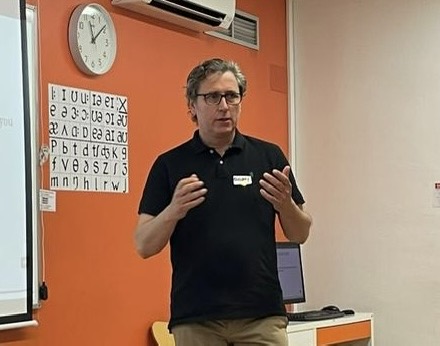The Real Reason Teachers Avoid Feedback During Speaking Tasks
- Barnaby Griffiths

- Sep 12, 2025
- 2 min read

Many teachers hesitate to correct students during speaking tasks. Not because they doubt its value, but because they fear discouraging learners.
This fear came through clearly in two recent polls I ran with over 90 teacher responses. While my original question was aimed at understanding why teachers hold back from correcting emergent language in group settings, the results and discussion confirm something I’ve seen for years as a TESOL Diploma trainer:
Fear of discouraging learners is the number one reason teachers avoid giving feedback - even though it’s often the very thing students want most when done well.
Poll Results
Worry it discourages learners: 39% & 47%
Time pressure / pacing lessons: 32% & 20%
Class size / noise: 20% & 13%
Noting corrections live: 9% & 20%
These responses highlight a common tension: teachers know feedback matters, but they’re concerned about the impact of correction on confidence. When feedback is handled poorly, it can feel like public criticism. Done well, it becomes one of the most powerful tools for building learners’ skills and confidence.
What Other Teachers Are Saying
The comments on these polls offered valuable insight:
Emma Meade-Flynn pointed out that correction is influenced by deeper teacher factors — knowledge, technique, and confidence — and shared practical strategies such as “sit and stay” monitoring and delayed feedback.
Dylan Gates highlighted time management, noting teachers often don’t leave enough time for feedback cycles or task repetition.
Alexander Becker and others echoed that time pressure and class size play a big role.
Laurence Howells offered a learner’s view, expressing frustration when mistakes are ignored and showing how constant correction in Silent Way classes can increase confidence.
Leyla Masmaliyeva added cultural and peer dynamics to the discussion.
Anthony Green reminded us that past punitive correction shapes learner attitudes, emphasising the importance of reframing errors as learning opportunities.
Beyond Mistakes: The Bigger Picture
Effective correction is about more than just fixing errors:
Balancing fluency and accuracy
Timing feedback so it feels supportive, not punitive
Developing teacher skills for live monitoring and delayed correction
Building a classroom culture where feedback is expected and welcomed
When teachers hesitate, it’s often due to a lack of training and techniques rather than a lack of belief in the value of feedback.
Moving Forward
I believe effective feedback is one of the highest-impact skills in language teaching and coaching - yet it remains undertrained and misunderstood.
I’m currently writing a new book, Using Language and Communication Coaching with Groups, which explores practical ways to give feedback that empowers learners in group settings.
For now, you can download my free 35-page guide for practical strategies you can apply immediately:
Barnaby Griffiths is an experienced TESOL Diploma trainer, author of Language and Communication Coaching: The Essential Guide, and founder of Barnaby Griffiths Language Consultancy.

Comments